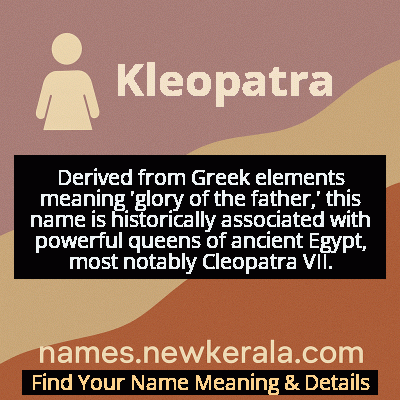Kleopatra Name Meaning & Details
Origin, Popularity, Numerology Analysis & Name Meaning of Kleopatra
Discover the origin, meaning, and cultural significance of the name KLEOPATRA. Delve into its historical roots and explore the lasting impact it has had on communities and traditions.
Name
Kleopatra
Gender
Female
Origin
Greek
Lucky Number
9
Meaning of the Name - Kleopatra
Derived from Greek elements meaning 'glory of the father,' this name is historically associated with powerful queens of ancient Egypt, most notably Cleopatra VII.
Kleopatra - Complete Numerology Analysis
Your Numerology Number
Based on Pythagorean Numerology System
Ruling Planet
Mars
Positive Nature
Generous, passionate, energetic, and humanitarian.
Negative Traits
Impulsive, impatient, moody, and can be overly emotional.
Lucky Colours
Red, maroon, scarlet.
Lucky Days
Tuesday.
Lucky Stones
Red coral, garnet.
Harmony Numbers
1, 2, 3, 6.
Best Suited Professions
Military, sports, philanthropy, leadership roles.
What People Like About You
Courage, energy, leadership, generosity.
Famous People Named Kleopatra
Cleopatra VII Philopator
Pharaoh of Egypt
Last active ruler of Ptolemaic Egypt, known for political alliances with Roman leaders and her dramatic suicide
Cleopatra Thea
Seleucid Queen
Influential ruler who played key political and military roles in the Hellenistic Seleucid Empire
Cleopatra Selene II
Queen of Mauretania
Daughter of Cleopatra VII who became an important ruler in North Africa after her parents' deaths
Cleopatra of Macedon
Macedonian Princess
Sister of Alexander the Great who influenced early Hellenistic politics
Name Variations & International Equivalents
Click on blue names to explore their detailed meanings. Gray names with will be available soon.
Cultural & Historical Significance
Cleopatra VII's legendary status transformed the name into a cultural icon representing intelligence, political acumen, and feminine power. Her story has been retold through Shakespeare's plays, Hollywood films, and countless artistic representations, creating a lasting archetype of the seductive, intelligent queen. The name symbolizes the cultural fusion of Greek and Egyptian traditions during the Hellenistic period and represents one of history's most dramatic stories of power, romance, and tragedy. Beyond the famous Egyptian queen, the name appears in various historical contexts, including Cleopatra of Macedon (sister of Alexander the Great) and Cleopatra Thea of the Seleucid Empire, demonstrating its widespread prestige among ancient ruling families.
Extended Personality Analysis
Individuals named Kleopatra are often associated with a complex blend of personality traits influenced by the name's historical and cultural weight. They tend to project confidence, intelligence, and natural leadership abilities, often possessing sharp political instincts and strategic thinking. The name suggests someone who is culturally sophisticated, possibly multilingual, and comfortable in diverse social settings—qualities that mirror the historical Cleopatra's renowned education and diplomatic skills.
There's often an element of dramatic presence and charisma associated with the name, suggesting someone who commands attention in any room. These individuals may exhibit strong willpower and determination, coupled with a certain theatricality in their self-expression. The name also implies emotional depth and intensity, with potential for passionate relationships and strong loyalties. However, bearing such a historically significant name can create pressure to live up to its legacy, potentially fostering ambition and a drive for achievement. Modern Kleopatras often develop resilience and self-awareness from navigating others' expectations while forging their own identity separate from the famous queen.
Modern Usage & Popularity
In contemporary naming practices, Kleopatra maintains a distinctive presence as a powerful but uncommon choice. The name sees moderate usage in Greece and Cyprus, where traditional Greek names have experienced renewed interest. Among Greek diaspora communities worldwide, it serves as a connection to cultural heritage while honoring a legendary historical figure. Internationally, the name appears sporadically, often chosen by parents seeking a name with strong feminist connotations and historical significance. While the 1963 film 'Cleopatra' starring Elizabeth Taylor created brief spikes in popularity, the name has never achieved mainstream status in English-speaking countries, likely due to its strong singular association and perceived weight. Recent trends show growing interest in powerful historical names for girls, potentially leading to increased usage. The name ranks outside the top 1000 in the United States and United Kingdom but maintains consistent usage as an unconventional yet instantly recognizable choice that conveys intelligence, strength, and cultural sophistication.
Symbolic & Spiritual Meanings
Symbolically, Kleopatra represents a rich tapestry of meanings that have evolved over centuries. Primarily, it symbolizes feminine power and intelligence in male-dominated spheres, embodying the archetype of a woman who used her intellect, education, and political savvy to navigate complex power structures. The name carries connotations of cultural fusion, representing the meeting of Greek and Egyptian civilizations during the Hellenistic period. It also symbolizes beauty, seduction, and theatricality, influenced by romanticized accounts of Cleopatra VII's life and her legendary relationships with Roman leaders.
In a broader metaphorical sense, Kleopatra has come to represent the precarious nature of power and the dramatic consequences of political and personal alliances. The name evokes themes of legacy, ambition, and the intersection of personal desire with political necessity. In modern contexts, it symbolizes breaking gender barriers and challenging traditional expectations of female behavior. The name also carries undercurrents of tragedy and sacrifice, reflecting the dramatic end of both Cleopatra's life and the Ptolemaic dynasty. Ultimately, Kleopatra serves as a powerful symbol of a woman who shaped history through her intelligence, determination, and unwillingness to be defined by others' expectations.

